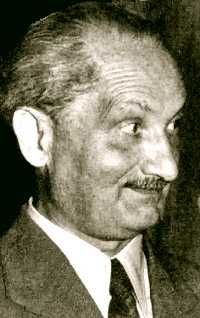 If becoming homely belongs essentially to historicality, then a historical peole can never come to satisfy its essence of its own accord or directly within its own language. A historical people is only from the dialogue between its language and foreign languages. That is presumably why we still learn foreign languages today. Both we and the Japanese learn the Anglo-American language. That has its own technical and practical necessity, which no sane person can doubt. The only question that remains is whether we recognize the essential danger over and beyond the usefulness of such knowledge of languages. This danger lies in the fact that we now generally assess every relation to a foreign language solely in terms of our commonplace, technical relationship to commonplace foreign languages. If we do that, then translation, for example, counts for nothing more than a technical measure. "Translating" is a kind of "detour" in the circulation of language. We scarcely have any intimation remaining of the fact that translation can still be a dialogue, assuming, of course, that the language to be translated is still of sich a kind as to be an essential language. "Translating" (Übersetzen) is not so much a "trans-lating" (über-setzen) and passing over into a foreign language with the help of one's own. Rather, translation is more an awakening, clarification, and unfolding of one's own language with the help of an encounter with the foreign language. Reckoned technically, translation means substituting one's own language for the foreign language, or vice versa. Thought in terms of historical reflection, translation is an encounter with a foreign language for the sake of approriating one's own language. It is therefore certainly not a matter of indifference whether one no longer learns any foreign languages at all, or whether, for example, one learns only English or American for technical or practical purposes of communication, or whether (and this is not just a mere example) we seek to gain entry into the linguistic spirit of the Greek language.
If becoming homely belongs essentially to historicality, then a historical peole can never come to satisfy its essence of its own accord or directly within its own language. A historical people is only from the dialogue between its language and foreign languages. That is presumably why we still learn foreign languages today. Both we and the Japanese learn the Anglo-American language. That has its own technical and practical necessity, which no sane person can doubt. The only question that remains is whether we recognize the essential danger over and beyond the usefulness of such knowledge of languages. This danger lies in the fact that we now generally assess every relation to a foreign language solely in terms of our commonplace, technical relationship to commonplace foreign languages. If we do that, then translation, for example, counts for nothing more than a technical measure. "Translating" is a kind of "detour" in the circulation of language. We scarcely have any intimation remaining of the fact that translation can still be a dialogue, assuming, of course, that the language to be translated is still of sich a kind as to be an essential language. "Translating" (Übersetzen) is not so much a "trans-lating" (über-setzen) and passing over into a foreign language with the help of one's own. Rather, translation is more an awakening, clarification, and unfolding of one's own language with the help of an encounter with the foreign language. Reckoned technically, translation means substituting one's own language for the foreign language, or vice versa. Thought in terms of historical reflection, translation is an encounter with a foreign language for the sake of approriating one's own language. It is therefore certainly not a matter of indifference whether one no longer learns any foreign languages at all, or whether, for example, one learns only English or American for technical or practical purposes of communication, or whether (and this is not just a mere example) we seek to gain entry into the linguistic spirit of the Greek language.The decision that thus falls with our choice of foreign languages is in truth a decision about our own language, namely the decision as to whether we use our own language too merely as a technical instrument, or whether we honor it as the concealed shrine that, in belonging to being, preserves within it the essence of human beings.
Back to the "humanist Gymnasium", then. No. For at historical moments of the kind now preparing itself, any mere "back to" is a self-deception, whether it is a return to classical antiquity or to the New Testament. For it would always be too shortsighted were we to think that learning the Greek language is something to be recommended so that we can read the great poets and thinkers in the original, so as to count as "educated", and, as a consequence of such education, to appear as a "cultured people". We learn the Greek language so that the concealed essence of our own historical commencement can find its way into the clarity of our word. Yet it belongs to such a task that we recognize the singular essence of the Greek world and acknowledge it in its singularity. We may learn the Greek language only when we must learn it out of an essential historical necessity for the sake of our own German language. For we must also first learn our own German language; and because we think that this happens of its own accord, we shall learn it with the greatest difficulty and thus endanger it most readily through mere neglect. To learn language means to learn to hear, not only to hear pronunciation, but rather to hear what is pronounced. Hearkening and being able to hearken are the fundamental condition for any genuine reading of the genuine word. It is here that interpretation and translation have their own and singular element.
Martin Heidegger. Hölderlin's Hymn "The Ister". William McNeill & Julia Davis (trad). Indiana University Press: 1996

Sem comentários:
Enviar um comentário